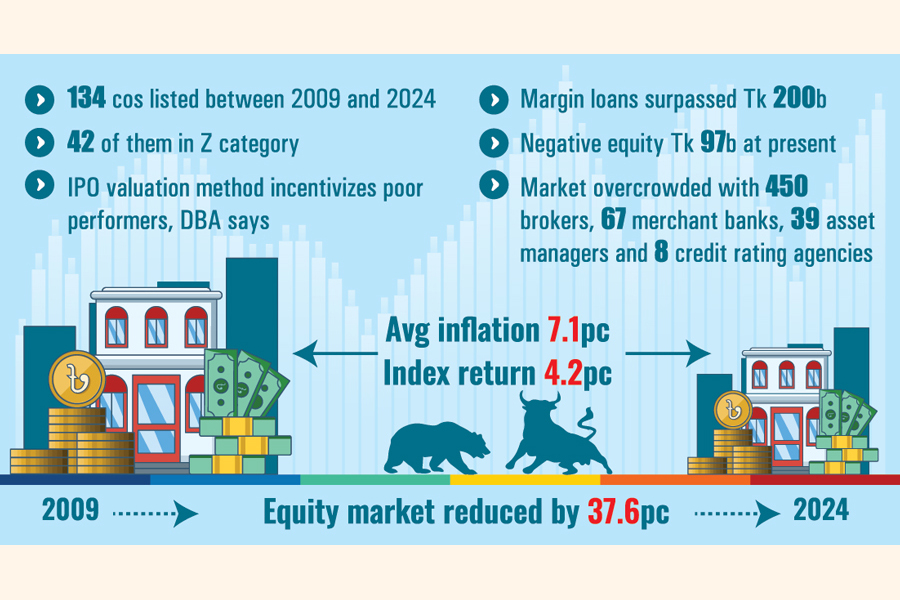
Published :
Updated :

Bangladesh's stock market, if adjusted to inflation, has been reduced by 37.6 per cent in the past 16 years, according to a research paper of the DSE Brokers Association of Bangladesh (DBA).
The annual average return of the index was 4.2 per cent between 2009 and 2024 whereas average inflation was 7.1 per cent during the period. That means the market had a yearly negative growth of nearly 3 per cent.
The DBA presented the research paper titled "The current state of Bangladesh capital market and way forward" at a seminar organised in the capital on Wednesday.
"The stock market failed to create wealth for general investors in the last 16 years," reads the study report presented by Md Saifuddin, vice president of the DBA.
On the other hand, manipulators and vested interest groups made money out of artificial rallies at the expense of general investors.
In the latest market boom, the prime index of the Dhaka bourse skyrocketed from 2,808 points in January 2009 to 8,900 points in December 2010. The index soared three-fold in just two years' time only to crash to wipe out investments of general investors.
Faruq Ahmad Siddiqi, former chairman of the Bangladesh Securities and Exchange Commission (BSEC), who attended the event as a special guest, cited two regulatory moves that damaged the equity market severely.
The first one is the prevention of forced selling in margin accounts and the second was the imposition of floor price denting investor confidence.
The market has been bearing the burden of margin accounts with negative equity ballooning since 2010-11.
Lenders had disbursed margin loans to clients from money borrowed from their parent companies or other institutions. They were legally allowed to carry out forced sales in margin accounts as the investments fell below a stipulated level but previous commissions prevented lenders from doing so on the pretext of protecting investors' interests.
In the meantime, negative equity swelled to Tk 97 billion in the past 16 years.
"As a result, general investors and the overall market suffered. Investors, who did not take margin loans, also incurred losses," said Mr Siddiqi.
Another controversial decision -- the enforcement of floor price during the Covid-19 pandemic in 2020, and again in 2022 for 18 months -- drove away foreign investors.
Poor governance, weak IPOs
Absence of good governance in the market, inefficiencies, a lack of transparency, and poor IPOs have also hindered the growth of the county's equity market.
In the last 16 years, 134 companies have listed in the market, raising Tk 90 billion. Of them, 42 have been relegated to junk status, with many being transferred to Z category soon after listing.
Many of the poor-performing companies had received regulatory permission to float IPOs despite objections from the bourses.
In addition to this, the SME market was introduced, allowing very small sized, poorly-governed companies to come to the secondary market, says the keynote paper. They need not require compliance with stringent financial reporting.
The modification of the IPO (initial public offering) valuation method is a long-standing issue. Market intermediaries sought an immediate solution to attract well-performing companies.
"IPO valuation method is devoid of financial and economic logic, incentivizing low quality, poorly-governed companies," reads the research paper.
Mr Siddiqi said the BSEC should be held accountable for allowing so many questionable IPOs. A well-designed policy should be formulated on IPO to attract good companies to the market.
The problems surrounding negative equity, margin rules and IPO valuation method should be addressed on an urgent basis to revitalize the market.
"The market would not regain strength without listing of good companies," said Mr Siddiqi.
The governance of the market has been questionable, he said, adding that, "we heard allegations of corruption against the previous two commissions".
Mr Siddiqi also spoke about the role of the taskforce formed to suggest reforms to the market.
"The ToR (terms of reference) of the taskforce has 17 issues that it is supposed to look into and suggest reforms in the interest of the market and investors."
Although five months have passed, the taskforce has submitted its recommendations only on two issues -- mutual fund and margin loans, said Mr Siddiqi.
Market stakeholders say there are issues beyond the ToR of the taskforce, which need quick fixing.
However, Mr Siddiqi said the economy has been recovering gradually from political instability that emerged in July last year.
"If the overall economy improves, the capital market will become stable," he added.
No govt owned capital market
Amir Khasru Mahmud Chowdhury, former commerce minister, who attended the programme as chief guest, said no government as of now considered the market as a vital organ of the economy.
The previous Awami League-led government used the stock market for political exploitation, he said. "If the BNP is elected by the people and forms a government in the coming days, we will own the stock market. It will be brought into the position of the main driving force of the economy."
Mr Khasru said financial institutions of the country and their regulatory bodies had become entangled with the political system in the last 15-16 years. As a result, these institutions did not perform their duties as stipulated. Instead, they became highly politicized.
"For this reason, the Bangladesh Bank and the capital market regulator did not function as independent institutions.
"Without an elected political government, investors will not regain confidence in the market."
The top BNP leader also demanded that those, who had looted the stock market during the Awami League-led government, be brought to justice. He also asked the owners of brokerage firms to be vocal in this regard.
babulfexpress@gmail.com


 For all latest news, follow The Financial Express Google News channel.
For all latest news, follow The Financial Express Google News channel.